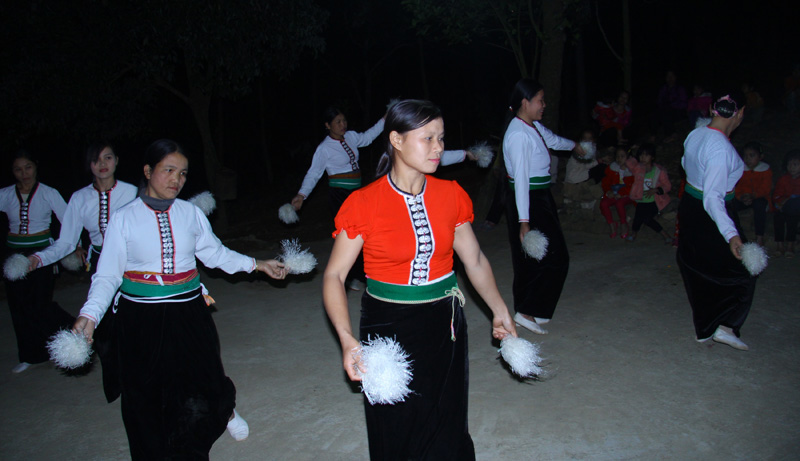
(HBO) – Thung Nai is a commune in Cao Phong district, about 25km from Hoa Binh city, is an ideal destination for tourists who love the pristine beauty of Hoa Binh lake. We visited Thung Nai in an autumn sunny morning. The road to Thung Nai is winding under the sunny and crystal-clear sky. There are some tranquil villages on the side of the lake.
Tourists will enjoy art performances by locals
when visiting tourist sites in Thung Nai commune, Cao Phong district.
Legend has it that Thung
Nai used to be a vast valley surrounded by high mountains, forests with
countless deer, making the name Thung Nai (the valley of deer). Afterwards, the
construction of the Hoa Binh hydropower dam on the Da River took a large area
of Thung Nai. High mountains in the area now become islands in different sizes in
the vast lake, dubbed "Ha Long Bay on land”. Let’s spend at least a full day to
enjoy the site.
It is romantic to explore Thung Nai by a tourist boat. From Thung Nai pier, tourists
can enjoy the lake’s tranquil landscape in breezy and fresh atmosphere on local
boats. Thung Nai is the most attractive in autumn with breeze and light
sunlight. The scene of sky and water in autumn brings a primitive beauty to
Thung Nai, enchanting visitors.
Thung Nai is said to be the harmonious combination of mountains, forests,
islands in various sizes and the water colour outlined in the sky. There are
many places for tourists in Thung Nai. It takes around 30 minutes by boat to
get the Thac Bo temple, where tourists can offer incense, learn the history of
the temple, explore the mystery and charm of Thac Bo cave with stalactites in different
shapes and sizes, enriching visitors’ imagination.
Tourists can also visit and enjoy local food on numerous islands in the lake,
such as Dua (coconut), Xanh (green), Qua (crow), De (goat) islands.
Tourists will have interesting sentiments when visiting the windmill where they
can see the panorama of Thung Nai which is appeared dimly in the misty morning
or is seen verdantly in the sunny day.
By night, tourists can join campfire and enjoy songs and dances performed by
locals. Home-stay service is also available in the locality, so visitors can
stay with local people, join their production and daily life activities and enjoy
local dishes and specialties such as smoked fish, roasted pork and local
vegetables with special seasoning.
Besides, visitors can go with locals on their boats to the lake to fish for
their food, an unforgettable memory for anyone who comes to Thung Nai./.
Spanning thousands of hectares and winding gracefully along mountain slopes, hillsides, and riverbanks, the terraced rice fields of Lac Son District present a stunning and captivating beauty. This region, renowned for its remarkable terraced landscapes, is also the centre of Hoa Binh Culture known for numerous archaeological sites.
The life of Mong people in Hang Kia and Pa Co communes of Mai Chau district has improved much thanks to tourism development.
The man-made Hoa Binh Lake, with a water surface area of approximately 9,000 hectares and a capacity of 9.45 billion cubic meters, stretches over 200 kilometers from Hoa Binh to Son La provinces. With the goal of developing into a national tourism area, the Hoa Binh Lake tourism area is expected to not only become the largest tourism centre in the province but also one of the 12 key tourist destinations in the northern midland and mountainous region of Vietnam.
Da Bia hamlet, now Duc Phong, in Tien Phong commune, Da Bac district, was once almost isolated from the outside as the only way to the hamlet was to get a boat ride across the Hoa Binh reservoir. However, as its tourism potential has been unleashed, the hamlet has established itself as one of the most attractive destinations on the tourism map. It has even received the ASEAN Community-Based Tourism Awards in 2019.
In the first 9 months of 2024, Mai Chau district, Hoa Binh province welcomed over 684 thousand visitors to visit and relax. In which, over 516 thousand domestic visitors and more than 168 thousand international visitors. Total revenue from tourism is estimated at over 821 billion VND.
Da Bac district, bestowed with stunning landscapes, is developing ecological and resort tourism offerings. Several tourist sites, put into operation this year, has attracted throngs of high-spending and young domestic visitors.



